Barack Obama’s original sin: America’s post-racial illusion
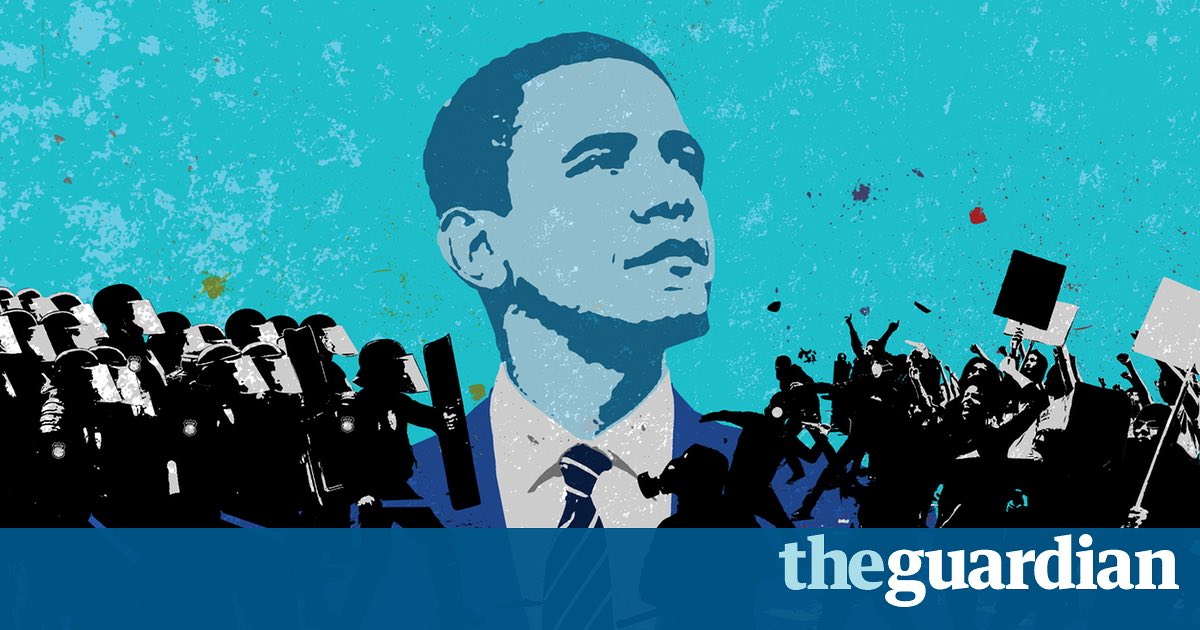
For African Americans, Obamas presidency has been largely defined by his reluctance to engage with discrimination and a racist criminal justice system
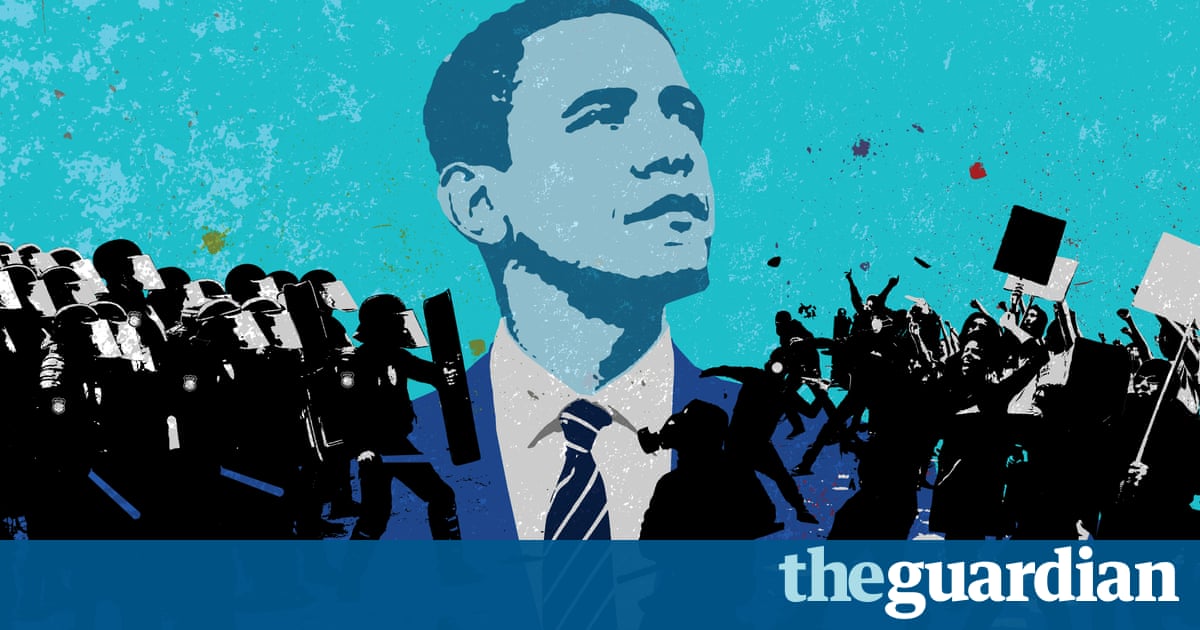
In the first hours of the new year in 2009, just weeks before Barack Obama was to be inaugurated as the next president, shots rang out in Oakland, California. A transit officer named Johannes Mehserle shot an unarmed 22-year-old black man who lay face-down in handcuffs on a public transportation platform. His name was Oscar Grant.
Dozens of witnesses, many of whom were returning to Oakland after New Years Eve celebrations, watched in horror. Some captured his killing on smartphones. Shortly afterward, black Oakland exploded in palpable anger, with hundreds, then thousands of people taking to the streets, demanding justice.
Perhaps this outcry would have happened under any circumstance, but the brutality of Grants death in the few weeks before the countrys first black president was to take office felt like a shock of cold water. Police brutality had long been a fact of life in California, but the country was supposed to have entered into a post-racial parallel universe. The optimism that coursed through black America in 2008 seemed a million miles away.
A local movement led by Grants family unfolded across the Bay Area to demand that prosecutors charge and try Mehserle. Protests, marches, campus activism, public forums and organizing meetings sustained enough pressure to force local officials to charge Mehserle with murder. It was the first murder trial of a California police officer for a line of duty killing in 15 years. In the end, Mehserle, convicted of involuntary manslaughter, spent less than a year in prison, but the local movement foreshadowed events to come.
As for President Obama, he turned out to be very different from candidate Obama, who had stage-managed his campaign to resemble something closer to a social movement. He had conjured much hope, especially among African Americans but with great expectations came even greater disappointments.
Yes, we can
In the heated race for the 2008 Democratic nomination, Obama distinguished himself from the establishment candidate, Hillary Clinton, by campaigning clearly against the war in Iraq and vowing to shut down the Guantnamo military internment camp. As the campaign continued, he spoke of economic inequality and connected with young people who were underwhelmed at the prospect of voting for yet another old, white windbag in the form of John McCain.
Black peoples enthusiasm for the Obama campaign could not be reduced to racial solidarity or recrimination. Obama electrified his audiences, as in this speech from January 2008, after the New Hampshire primary:
Weve been warned against offering the people of this nation false hope.
But in the unlikely story that is America, there has never been anything false about hope. For when we have faced down impossible odds, when weve been told were not ready or that we shouldnt try or that we cant, generations of Americans have responded with a simple creed that sums up the spirit of a people: yes, we can. Yes, we can. Yes, we can.
It was a creed written into the founding documents that declared the destiny of a nation: yes, we can.
It was whispered by slaves and abolitionists as they blazed a trail towards freedom through the darkest of nights: yes, we can.
It was sung by immigrants as they struck out from distant shores and pioneers who pushed westward against an unforgiving wilderness: yes, we can Yes, we can heal this nation. Yes, we can repair this world. Yes, we can.
But it was only in March 2008 that Obama finally gave a comprehensive speech on race, in which he pulled off the feat of addressing the concerns of African Americans while calming the fears of white voters.
Obama had been pressured for weeks to rebuke his pastor, the Rev Jeremiah Wright, who had delivered a sermon titled God Damn America, referring to the wrong the United States had committed in the world. Obamas political enemies had unearthed the sermon and tried to attribute Wrights ideas to Obama. Obama used his platform in Philadelphia to distance himself from Wright, whom he described as divisive and with a profoundly distorted view of this country.
He went on to contextualize Wrights angry comments and condemnations as based on his having come of age in a US where legalized discrimination where black people were prevented, often through violence, from owning property, or loans were not granted to African American business owners, or black homeowners could not access FHA mortgages, or blacks were excluded from unions or the police force or the fire department meant that black families could not amass any meaningful wealth to bequeath to future generations.
No one running for president had ever spoken so directly about the history of racism in government and society at large. Yet Obamas speech also counseled that a more perfect United States required African Americans taking full responsibility for our own lives by demanding more from our fathers, and spending more time with our children, and reading to them, and teaching them that while they may face challenges and discrimination in their own lives, they must never succumb to despair or cynicism; they must always believe that they can write their own destiny.
Obama couched his comments in the language of American progress and the vitality of the American dream, but the speech was remarkable nonetheless in the theater of American politics, where cowardice and empty rhetoric are the typical fare. In that sense Obama broke the mold, but he also established the terms upon which he would engage race matters: with dubious even-handedness, even in response to events that required decisive action on behalf of the racially aggrieved.
He spoke quite eloquently about the nations original sin and dark history but has repeatedly failed to connect the sins of the past to the crimes of the present, when racism thrives, when police stop-and-frisk, when subprime loans are reserved for black buyers, when public schools are denied resources, and when double-digit unemployment has become so normal that it barely registers a ripple of recognition.
Before Ferguson, Obamas Philadelphia speech was as close as he had ever come to speaking truthfully about racism in the US, even though he presented himself as an interested observer, a thoughtful interlocutor between African Americans and the country as a whole, rather than a US senator with the political influence to effect the changes of which he spoke.
The informed observer
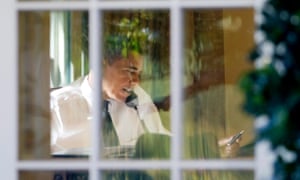
Obama would continue in his role as informed observer even as president.
Obama has and will always poll high among African Americans, but that should not be mistaken for blind support for him or the policies he champions. As long as members of the Republican party treat Obama in a brazenly racist manner, black people will defend him because they understand that those attacks against Obama serve as a proxy for attacks on them.
Early in his administration, however, with the full effects of the recession still pulsing in black communities, conflict between the black president and his base could be detected. Black America was in the midst of an economic freefall as black wealth disappeared.
As black unemployment was climbing into the high double digits, civil rights leaders asked Obama if he would craft policies to address black joblessness. He responded, I have a special responsibility to look out for the interests of every American. Thats my job as president of the United States. And I wake up every morning trying to promote the kinds of policies that are going to make the biggest difference for the most number of people so that they can live out their American dream.
It was a disappointing response, even if that disappointment did not manifest itself in his approval ratings. In 2011, with black unemployment above 13%, 86% of black Americans approved of the overall job the president was doing, but 56% expressed disappointment in the area of providing proper oversight for Wall Street and the big banks.
For African Americans, Obamas presidency had been largely defined by his reluctance to engage with the ways that racial discrimination was blunting the impact of his administrations recovery efforts. Obama has not shown nearly the same reticence when publicly chastising African Americans for a range of behaviors that read like a handbook on anti-black stereotypes, from parenting skills and dietary choices to sexual mores and television-watching habits.
There is something disingenuous in focusing on poor and working-class black people without any discussion about the ways that the criminal justice system has disappeared black parents from the lives of their children.
When Obama talks about absentee black fathers, he never mentions the disparity in arrests and sentencing that is responsible for the disproportionate number of missing black men. Few media discussions about Obamas candidacy mentioned curbing the nations criminal justice systems voracious appetite for black bodies: a million African Americans are incarcerated, and one in four black men between 20 and 29 are under the control of the criminal justice system.
Over the course of his first term, Obama paid no special attention to the mounting issues involving law enforcement and imprisonment, even as Michelle Alexanders The New Jim Crow described the horrors that mass incarceration and corruption throughout the legal system had inflicted on black families.
None of this began with Obama, but it would be naive to think that African Americans were not considering the destructive impact of policing and incarceration when they turned out in droves to elect him. His unwillingness to address the effects of structural inequality eroded younger African Americans confidence in the transformative capacity of his presidency.
The legacy of the American spring
There was one moment when black America collectively came to terms with Barack Obamas refusal to use his position as president to intervene on behalf of African Americans.
Troy Davis was a black man on death row in the state of Georgia. It was widely believed that he had been wrongfully convicted, which would mean that in the fall of 2011 he was facing execution for a crime he had not committed.
Daviss cries of innocence were not a voice in the wilderness: for years he and his sister, Martina Davis-Correia, had joined with anti-death-penalty activists to fight for his life and exoneration. By September 2011, an international campaign was under way to have him removed from death row. The protests grew larger and more frantic as the death date crept closer. There were protests around the world; support from global dignitaries rolled in as the international movement to stop Daviss execution took shape.
The European Union and the governments of France and Germany implored the United States to halt his execution, as did Amnesty International and the former FBI director William Sessions. A Democrat in the Georgia senate, Vincent Fort, called on those charged with carrying out the execution to refuse to do it: We call on the members of the Injection Team: Strike! Do not follow your orders! Do not start the flow of the lethal injection chemicals. If you refuse to participate, you make it that much harder for this immoral execution to be carried out.
As Daviss execution drew near on the evening of 20 September, people from around the world waited for Obama to say or do something but, in the end, he did nothing. He never even made a statement, instead sending press secretary Jay Carney to deliver a statement on his behalf, which simply noted that it was not appropriate for the president to intervene in a state-led prosecution.
In the end, the black president succumbed to states rights.
It was a moment of awakening for Generation O and of newfound understanding of the limits of black presidential power, not because Obama could not intervene, as his handlers insisted, but because he refused to do so.
The Troy Davis protests were certainly not in vain. The day after the state of Georgia killed Davis, Amnesty International and the Campaign to End the Death Penalty called for a Day of Outrage in protest. More than a thousand people marched, eventually making their way to a small encampment on Wall Street that was calling itself Occupy Wall Street.
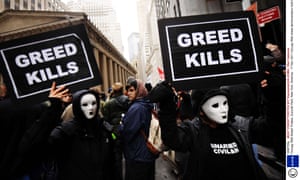
The Occupy encampment had begun a week or so before Davis was killed, but it was in its fledgling stages. When the Troy Davis activists converged with the Occupy activists, the protesters made an immediate connection between Occupys mobilization against inequality and the injustice in the execution of a working-class black man. After the march, many who had been activated by the protests for Davis stayed and became a part of the Occupy encampment on Wall Street. Thereafter, a popular chant on the Occupy marches was We are all Troy Davis.
The Occupy movement would develop into the most important political expression of the US class divide in more than a generation. The slogan We are the 99% and the movements articulation of the divide between the 1% and the rest of us offered a materialist, structural understanding of American inequality. In a country that regularly denies the existence of class, this was a critical step toward making sense of the limited reach of the American dream.
Despite the movements difficulties in coherently expressing the relationship between economic and racial inequality, its focus on government bailouts for private enterprise while millions of ordinary people bore the weight of unemployment, foreclosures, and evictions addressed some of the most important issues affecting African Americans. It was hard to ignore that black homeowners had been left to fend for themselves.
Not only did Occupy popularize the notion of economic and class inequality in the US by demonstrating against corporate greed, fraud, and corruption throughout the finance industry, it also helped to make connections between those issues and racism. The public discussion over economic inequality that followed rendered incoherent both Democratic and Republican politicians insistence on locating black poverty in black culture. While it obviously did not bury the arguments for culture and personal responsibility, Occupy helped to create the space for alternative explanations within mainstream politics, including seeing black poverty as a product of the system.
The vicious attack and crackdown on the unarmed and peaceful Occupy encampments over the winter and into 2012 also provided a lesson about policing in the US: the police were servants of the political establishment and the ruling elite. Not only were they racist, they were also shock troops for the status quo and bodyguards for the 1%.
If I had a son, hed look like Trayvon
The killing of Trayvon Martin in Sanford, Florida, in the winter of 2012 was a turning point. Like the murder of Emmett Till nearly 57 years earlier, Martins death pierced the delusion that the US was post-racial.
Till was the young boy who, on his summer vacation in Mississippi in 1955, was lynched by white men for an imagined racial transgression. Tills murder showed the world the racist brutality pulsing in the heart of the worlds greatest democracy. To emphasize the point, his mother, Mamie, opted for an open-casket funeral to show the world how her son had been mutilated and killed in the land of the free.
Martins crime was walking home in a hoodie, talking on the phone and minding his own business. George Zimmerman, now a well-known menace but then portrayed as an aspiring security guard, racially profiled Martin, telling the 911 operator: This guy looks like hes up to no good, or hes on drugs or something. The guy was a 17-year-old boy walking home from a convenience store. Zimmerman followed the boy, confronted him, and eventually shot him in the chest, killing him shortly thereafter. When the police came, they accepted Zimmermans account. Martin was black and the default assumption was that he was the aggressor so they treated him as such. They tagged him as a John Doe and made no effort to find out if he lived in the neighborhood or was missing.
But the story began to trickle through the news media and, as more details became public, it was clear that Martin had been the victim of an unlawful killing. Trayvon Martin had been lynched.
Within weeks, protests bubbled up across the country. The demand was simple: arrest George Zimmerman for the murder of Trayvon Martin. The anger was fueled, in part at least, by the overwhelming double standard: if Martin had been white and Zimmerman black, Zimmerman would have faced immediate arrest, if not worse.
The protests were national, as they had been for Troy Davis, but they were much more widespread. This was the impact of Occupy, which had relegitimized street protests, occupations, and direct action in general. Many of the Occupy activists who had been dispersed by police repression the previous winter found a new home in the growing fight for justice for Martin. Protests in Florida and New York City reached into the thousands, with smaller protests in cities across the country.
For weeks, Obama deflected questions, commenting only that it was a local case. It took more than a month for Obama to finally speak publicly about the case, saying: If I had a son, hed look like Trayvon When I think about this boy, I think about my own kids.
But he also said: I think every parent in America should be able to understand why it is absolutely imperative that we investigate every aspect of this, and that everybody pulls together federal, state and local to figure out exactly how this tragedy happened.
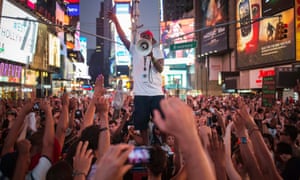
Obama could not come out and say the obvious, but the fact that he spoke at all was evidence of the growing momentum of the street protests that had been building for weeks. Martins killing was a national and international embarrassment. Black people may have understood that Obama could not lead a social movement against police brutality as the president, but how could he not use his seat to amplify black pain and anger? It was exactly for moments like these that black people had put Obama in the White House.
It is impossible to know or predict when a particular moment is transformed into a movement. Forty-five days after George Zimmerman killed Trayvon Martin in cold blood, he was finally arrested. It was the outcome of weeks of protests, many of which had been organized through social media, beyond the conservatizing control of establishment civil rights organizations.
In the summer of 2013, more than a year after his arrest, George Zimmerman was found not guilty of the murder of Trayvon Martin. His exoneration crystallized the burden of black people: even in death, Martin would be vilified as a thug and an aggressor, Zimmerman portrayed as his victim. The judge even instructed both parties that the phrase racial profiling could not be mentioned in the courtroom, let alone used to explain why Zimmerman had targeted Martin.
Obama addressed the nation, saying: I know this case has elicited strong passions. And in the wake of the verdict, I know those passions may be running even higher. But we are a nation of laws, and a jury has spoken. We should ask ourselves, as individuals and as a society, how we can prevent future tragedies like this. As citizens, thats a job for all of us.
What does it mean to be a nation of laws when the law is applied inequitably? There is a dual system of criminal justice: one for African Americans and one for whites. The result is the discriminatory disparities in punishment that run throughout all aspects of American jurisprudence. George Zimmerman benefited from this dual system: he was allowed to walk free for weeks before protests pressured officials into arresting him. He was not subjected to drug tests, though Trayvon Martins dead body had been. This double standard undermined public proclamations that the US is a nation built around the rule of law. Obamas call for quiet, individual soul-searching was a way of saying that he had no answers.
Out of despair over the verdict, the community organizer Alicia Garza posted a simple hashtag on Facebook: #blacklivesmatter. It was a powerful rejoinder that spoke directly to the dehumanization and criminalization that made Martin seem suspicious in the first place and allowed the police to make no effort to find out to whom this boy belonged.
It was a response to the oppression, inequality and discrimination that devalue black life every day.
It was everything, in three simple words.
Garza would go on, with fellow activists Patrisse Cullors and Opal Tometi, to transform the slogan into an organization with the same name: #BlackLivesMatter.
Zimmermans acquittal also inspired the formation of the important black Youth Project 100 (BYP 100), centered in Chicago. Charlene Carruthers, its national coordinator, said of the verdict: I dont believe the pain was a result, necessarily, of shock because Zimmerman was found not guilty but of yet another example of an injustice being validated by the state something that black people were used to.
In Florida, the scene of the crime, Umi Selah (formerly known as Phillip Agnew) and friends formed the Dream Defenders; for 31 days they occupied the office of the Florida governor, Rick Scott, in protest at the verdict. Selah said: I saw George Zimmerman celebrating, and I remember just feeling a huge, huge, huge collapse Ill never forget that moment because we didnt even expect that verdict to come down that night, and definitely didnt expect for it to be not guilty.
Selah quit his job as a pharmaceutical salesman to organize full time.
No one knew who would be the next Trayvon, but the increasing use of smartphone recording devices and social media seemed to quicken the pace at which incidents of police brutality became public. These tools being in the hands of ordinary citizens meant that families of victims were no longer dependent on the mainstream medias interest: they could take their case straight to the public.
Meanwhile, the formation of organizations dedicated to fighting racism through mass mobilizations, street demonstrations and other direct actions was evidence of a newly developing black left that could vie for leadership against more established and more tactically and politically conservative forces.
The black political establishment, led by Obama, had shown over and over again that it was not capable of the most basic task: keeping black children alive.
The young people would have to do it themselves.
Read more: https://www.theguardian.com/us-news/2017/jan/13/barack-obama-legacy-racism-criminal-justice-system